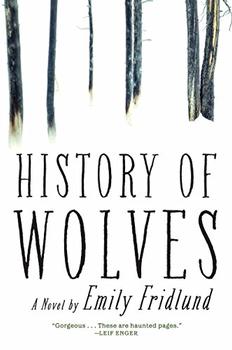Summary | Excerpt | Reading Guide | Reviews | Beyond the book | Read-Alikes | Genres & Themes | Author Bio

Sue Miller turns her magnifying glass on the family of Eva and Mark. Their
marriage hit a road bump some years back when Mark had an affair, and their three
teenage children now live with Eva and her second husband, John - that is until
he dies in a freak accident and Mark comes back into Eva's life to help with the
children while she grieves. While John is waking up to the fact that he
still loves Eva, Eva is confounded by her own grief, and the three children deal
with events in their own way, with much of the focus being on 15-year-old Daisy
as she deals with her loss via various secret acts of defiance, culminating in
an affair with an older man.
The question is, how will the characters
find their way through this loss and can Daisy find her way back to her path and out of the arms of the predatory
wolf (á la Little Red Riding Hood) or will
she be permanently lost in the forest? I know this sounds like pretty
standard stuff but as I've said before (and will likely say again!) it's not
what you tell, it's the way you tell it. In Miller's hands other people's
lives are surprisingly interesting!
Selected Reviews
"..... this fine novel .... is in fact gently comic. For, as we know,
comedy in literature stresses the community, and its ongoing life, while tragedy
stresses the individual, who is doomed. Lost in the Forest is a comedy in the
exact and best literary sense, for it stresses beautifully the continuation of
the social unit with which it is concerned." - Washington Post.
"....while some of her plots (that of While I Was Gone, for example) can
be cluttered and occasionally clumsy, Lost in the Forest has a seemingly
effortless grace; Miller quickly captures and never loses our attention." -
The New York Times Sunday Review.
![]() This review
first ran in the August 2, 2006
issue of BookBrowse Recommends.
This review
first ran in the August 2, 2006
issue of BookBrowse Recommends.

If you liked Lost In The Forest, try these:

by Emily Fridlund
Published 2017
Winner of the McGinnis-Ritchie award for its first chapter, Emily Fridlund's propulsive and gorgeously written History of Wolves introduces a new writer of enormous range and talent.

by Elizabeth Strout
Published 2014
Elizabeth Strout "animates the ordinary with an astonishing force," wrote The New Yorker on the publication of her Pulitzer Prize–winning Olive Kitteridge. The San Francisco Chronicle praised Strout's "magnificent gift for humanizing characters." Now the acclaimed author returns with a stunning novel as powerful and moving as any work in ...
Your guide toexceptional books
BookBrowse seeks out and recommends the best in contemporary fiction and nonfiction—books that not only engage and entertain but also deepen our understanding of ourselves and the world around us.